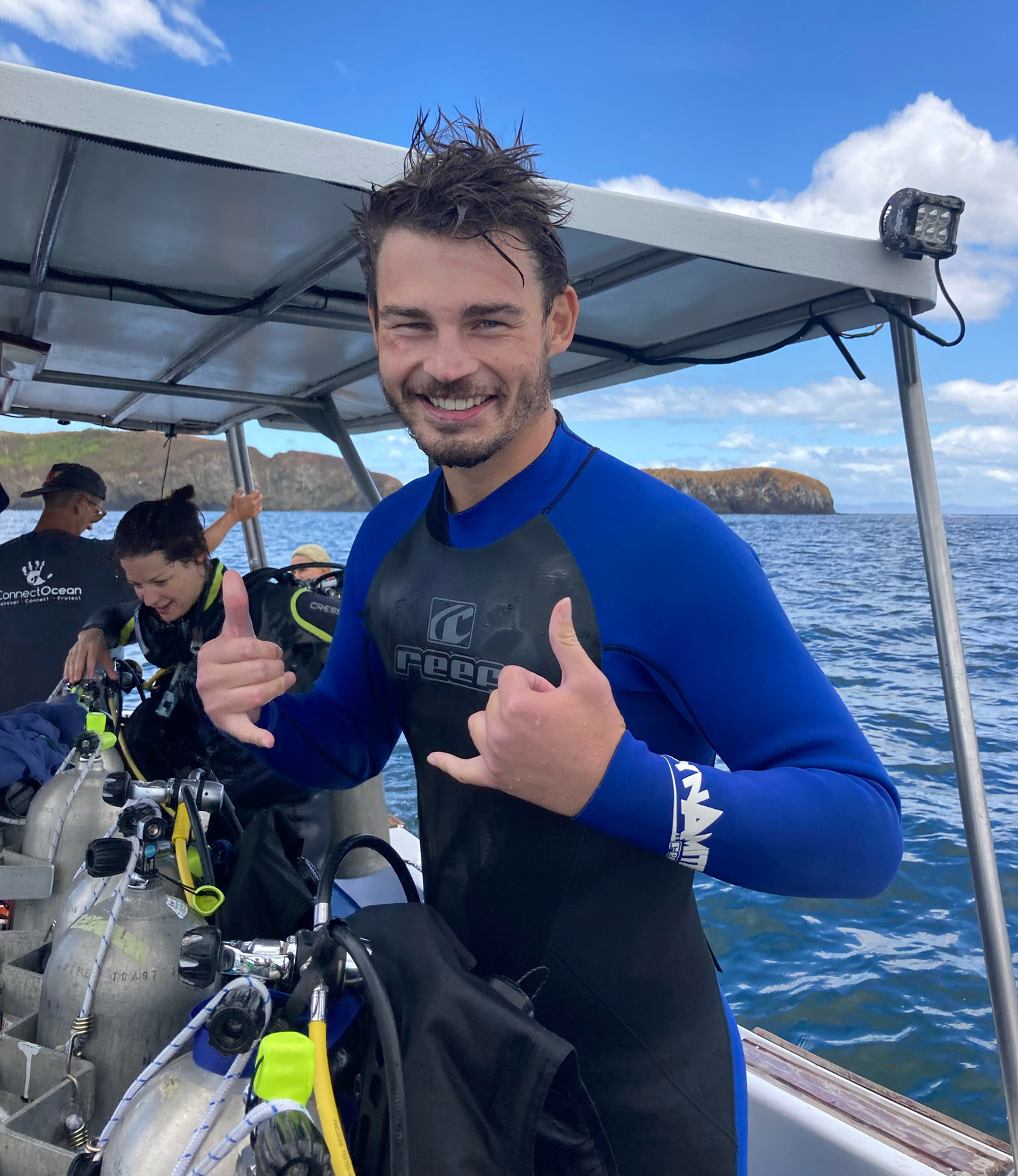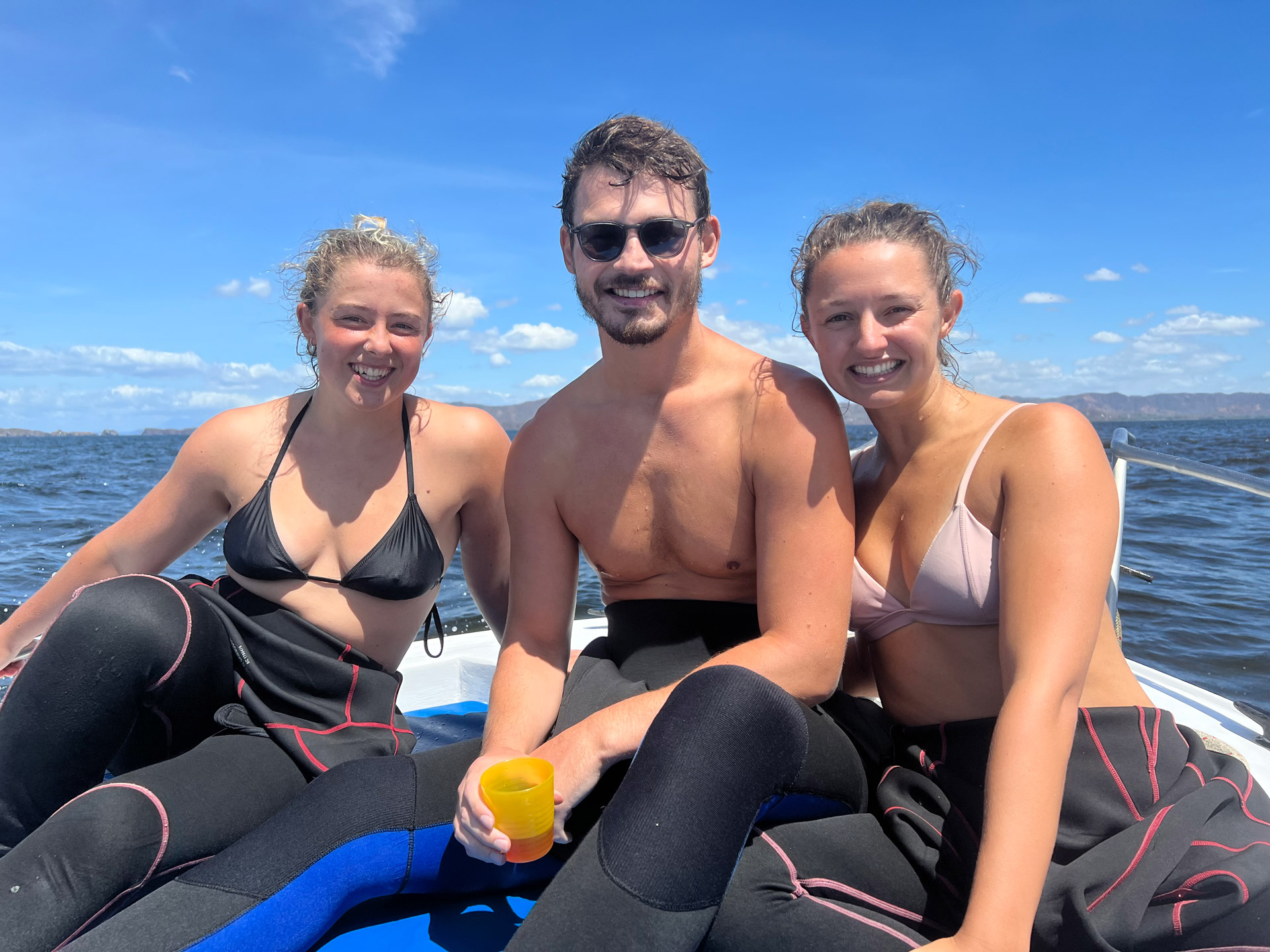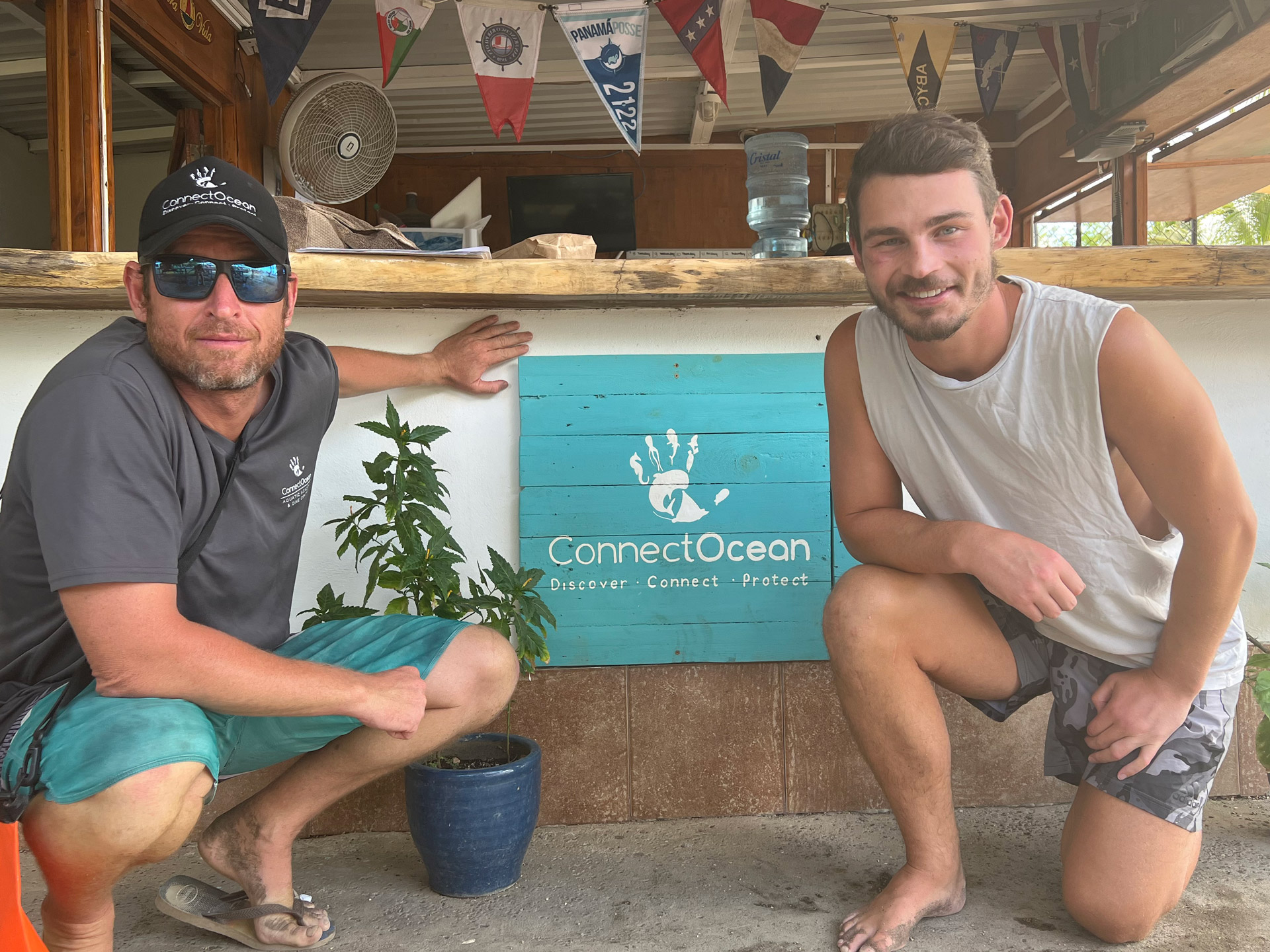As an ex-rugby player who had to walk away from the game due to post-concussion syndrome, I can tell you retirement is a shock. Since retiring, my sole focus has been to heal. Yet, it is hard to get away from the massive question mark hanging over every elite athlete’s head: “What will you do when you finish playing?”
After getting the go-ahead from my neurologist – and two more for good luck – I took the opportunity to try scuba diving with PADI in Playa Potrero, Costa Rica. Unable to do standard forms of exercise, I dared to dream this might be something I would be able to do despite my brain injury. Low risk of hitting my head, not overly taxing physically and getting to feel weightless underwater sounded like it could be a good match. Along with my partner Natalie, I met the rest of the team, led by Ernst Van dear Poll. I had the feeling this experience would lead to more than a fun new hobby but an entirely new lifestyle. Ernst had worked with many veterans and people struggling with brain injuries. This gave me confidence to give scuba a try. But I don’t just take the challenge to scuba as someone who is living with a brain injury, but I take on scuba to see what it can do for someone who has retired from rugby. I wanted to know what scuba could do for me as someone who is looking to the future for something to replace one of the longest relationships that I have ever had. Here’s what I learned from the PADI open water course…

You Gain A New Team
Like many rugby players, I’ve been a part of a team my entire life, probably since I was six. But, in life, what matches up to doing battle, shoulder to shoulder with your teammates? When you finish playing, you have to adjust to a life without a team. Sure, you can find ways to put yourself out of your comfort zone. I do public speaking and have acted a few times. They certainly tick the box of challenging yourself, but these challenges can feel quite solitary. When the challenge requires a team effort, where succeeding relies on everyone supporting each other, you get the added buzz of moving forward together as a unit. Without a trophy to win at the end, all the glue that holds the team together disappears.
Picture this…
What else in life could make your team stick together more than being at the bottom of the ocean out of air and needing your dive partner’s regulator? For the first time since finishing playing, I felt like that 10-year-old surrounded by my teammates learning a new skill with the anticipation and promise of something new on the horizon.
Ernst was an ex-rugby player and a natural leader, something every great team needs. It felt good to be a team diving into the unknown with complete trust and belief in the person leading us there. I found myself with a new set of signs and processes that only a scuba diver understands. It reminded me of the ‘nod’ and the ‘wink’ that rugby players give to each other in the changing rooms before the game. The silent knowing we are about to experience something remarkable… together.
On our first dive, we were not disappointed.
Descending down to the bottom of the ocean is the perfect way to build suspense. You could definitely say that we were straight in at the deep end. As soon as I got my bearings, looked at my teammates and gave the OK sign, we got lucky… or unlucky for some… I couldn’t shout, “oh my God, that’s a fucking shark”… only sign language is possible, and a shared understanding of that’s just how it is down here…
Finding team spirit is needed when you finish playing, but I can’t stress enough how that must go together with new and memorable experiences. Ones that you can further bake into your mind by re-living them with your teammates back on the boat after the dive. I remember that as a player, even the awful times out on the training pitch would be used to bring you closer as a team. It’s the special experiences that are the glue to connect you with the people around you
Self Esteem
When you finish playing rugby, part of your identity has the legs kicked beneath it. You’re no longer a Rugby player. EVERYTHING has revolved around this identity your whole life.
I remember clambering around in the darkness to try and find a part of my self-esteem to activate during a 12 month injury period when I was 22. I started writing; I even launched this online magazine. It was instinctual to find new ways to boost my self-esteem when rugby was temporarily taken away. After speaking to Dr Alan Johnston about mental health, I realised that we have to be proactive in building our self-esteem. Holding your entire self-esteem on being a rugby player leaves you vulnerable when you are inevitably no longer a rugby player. Instead, you have to take action.
There is nothing more self-confirming than pulling on your jersey and feeling like superman before kick-off. Then you get to head to the showers after the game with the full-body ache feeling proud of how you showed up for that win. It would be impossible for me to do this now. Despite this, I keep having a dream of lining up to kick-off and realising that I’ve forgotten my boots. To work through this loss, I need something else… I need to be someone else.
Diving has the echoes of that feeling. Kitting up before the dive, checking oxygen levels with your buddy and masking up before you plunge to the ocean’s depths felt like the introduction of a new part of myself.
Looking back on my PADI cert dives, it’s strangely similar to playing: the anticipation, and the not knowing what the next ‘half’ will contain. A dive is like a game; there is no time to not ‘be’ a Scuba Diver. Everything you do reinforces that identity. Every safety check, conscious breath, and new marine life that you see tells you “you are now a scuba diver”. With that comes a new lease of life and a new identity for the future.

For once, you set the pace
Scuba diving is student-centred. When you play rugby, you hurl yourself into the team’s mission, you are a part of a larger machine, and your job is to say ‘yes’.
My partner, Natalie, was pumped to learn to dive. She had no nerves heading out for our ocean dive, despite knowing we would have to do the exercises for the first time at the bottom of the ocean. The practices included:
To take your regulator out of your mouth and let go of it, re-find it and put it back in your mouth to go back to breathing normally.
To find your buoyancy so you can control your positioning underwater
A controlled emergency ascent
Natalie completed many of these with ease, but then it came to clearing water from a flooded mask…
Her body reacted.
She suddenly started rushing to the surface.
It was a panic reaction.
Ernst controlled the situation like a pro. He cleared the mask for her and helped calm her breathing…
in and out
in and out
Nat calmed down pretty quickly, and we carried on with the rest of the dive. However, when we got back on the boat after the dive, Nat wasn’t aware of her reaction until we told her. It was as if her instincts took over and her usual calm and collected mind were nowhere to be seen.
Natalie is a professional dancer. She is trained to block out the noise and get focused. So no matter what nerves, fears or feelings of discomfort you have, it doesn’t matter because it’s showtime- just like a rugby player when it’s game day. Back onshore, Nat reflected on how she felt before the dive… “I didn’t even feel any nerves,” she told me. Together we realised she probably did feel nervous, but with years of ignoring when her body/mind is holding her back, she has become useless at recognising when she genuinely feels uncomfortable in a situation.
Watching Natalie respond to her unexpected panic underwater was enlightening. She spent the rest of the day repeatedly practising the action of clearing your mask. It got to the stage where she filled the sink with water, put her head under and repeated the action over and over and over again. I’d never seen Nat like this before. I saw her dancer’s identity in action: rehearse, repeat, and never allow yourself to be less than perfect.
She woke up early to practice but then a light bulb went off. She turned to me and said, “I’m acting crazy… this isn’t my job. This isn’t a performance that relies on me getting this right. This isn’t a show that people have paid to see. I can say no.”
When you retire and try a new skill… it isn’t your job. You are the one in the driving seat, and WOW, that is empowering. For the first time in Nat’s life, she decided to not say yes and didn’t do the ocean dive that day. She told Ernst that she didn’t feel comfortable getting the water in her mask and wasn’t ready to progress and do it in the ocean. Ernst was supportive and encouraging. He offered her to have more days practising in the pool and when she was ready to go back to the ocean.
One part of retiring is about empowering yourself away from the game. You have to find your own boundaries and get used to making your own decisions. Learning to be a Scuba Diver gives you the chance to leave your comfort zone. But you can be the one who decides the pace. The instructors are there to serve you and your own unique challenges, but you can be the one who decides when to push forward.

That Winning Feeling
When I came up to the surface after passing my PADI I felt something that I had not felt for a long time. It was a BIG win. I felt an immense sense of achievement. During my Dives, I bumped into sharks and stingrays and had the ringing of nearby humpback whales in my ears. The more I was in the ocean, the more it felt natural. I started to master the nerves, self-doubt and skills to become a scuba diver. The sense of achievement felt like an old friend had come to visit. However, this type of winning was a new experience for me. As a rugby player, winning meant sacrifice, pain, adulation from the crowd, and months of proving yourself as stronger, more worthy and triumphant than the athlete’s opposite to be the ones lifting the trophy. Winning as a scuba diver was not about the outcome. The winning feeling came from being fully present whilst submerged in a new world, concentrating on your breath in and out as you explore and marvel at some of our planet’s most spectacular creatures.
As an athlete, we can get fixated on wins and losses and forget the real joy of playing comes from being completely in the moment. Stepping off your right foot, breaking a tackle, streaking through the line and it all happening without you even knowing it…. you just do it, freely, with no bounds or limits. Those are the special moments we can look over and instead focus on the number on the scoreboard. Scuba diving doesn’t have a scoreboard and you certainly don’t dive to get to the end of it. It fixes you in the present. It is bliss.
Beyond the present moment, scuba diving is sustainable. The winning feeling doesn’t have a sell-by date, and unlike rugby, you won’t have to retire from it. I watched my grandad travel and scuba dive for many years as a child. I loved hearing his stories about holidaying on a boat in Egypt, and spending most of his time underwater. Every rugby player will eventually retire from their career. Finding something to be their “thing” is non-negotiable. To have something that challenges them and enforces that beginner’s mindset whilst feeding that winning drive is crucial in bridging the gap.
Unfortunately, scuba isn’t something that I can do right now. As much as I enjoyed the experience, my vestibular symptoms were exasperated from being on the boat. I had a big dip in my health after the diving was over and it took well over a month to get my symptoms back under some kind of control. My migraines became constant and my tolerance to walking, travelling in cars and to light and sound decreased. For me, right now, I am not well enough to have scuba as part of my lifestyle, but I am glad I tried. This brings me to my final point…
Finishing playing shouldn’t be seen as “the end of your best days”; it should be the start of the rest of your life. Beginnings require you to TRY new things, TEST your comfort zones, and EXPLORE who you want to be going forward. Scuba doesn’t have to be a one-off, it can become a lifestyle, a new identity. It is a great vehicle for that tricky transitional period when you choose to step away from the game and what you have always known yourself to be. Scuba could be that next vehicle for you to live your life through…
You can look at doing your PADI open water dive certificate here (link)
We dived with connect ocean, playa Potrero (link)